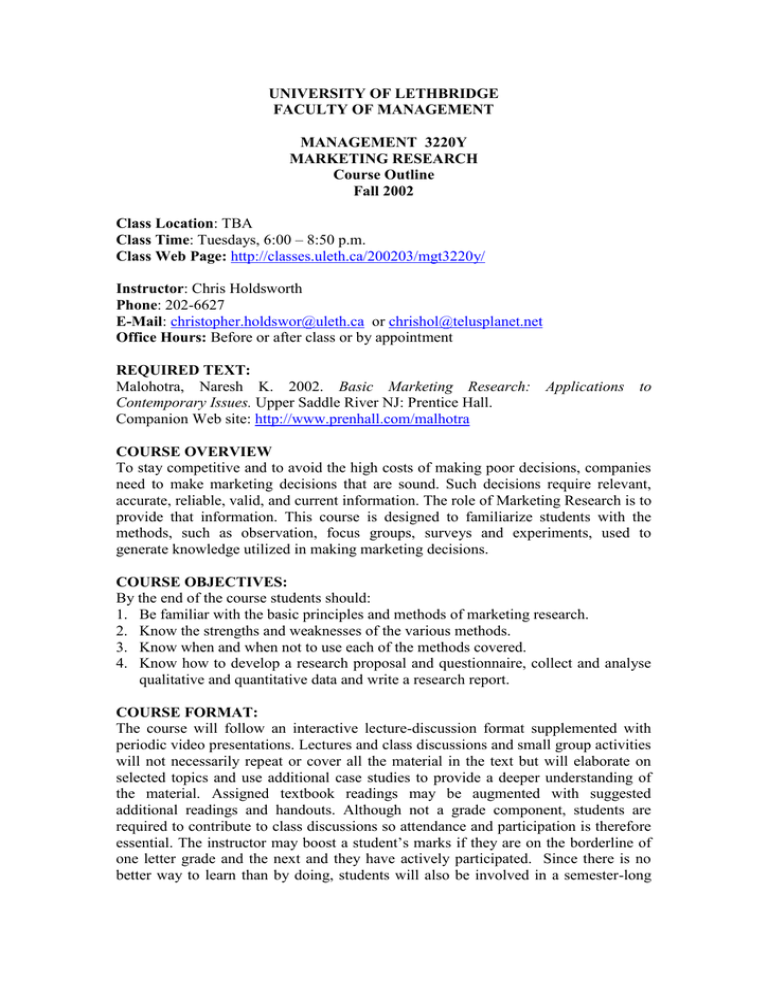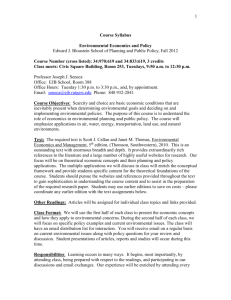UNIVERSITY OF LETHBRIDGE FACULTY OF MANAGEMENT MANAGEMENT 3220Y
advertisement

UNIVERSITY OF LETHBRIDGE FACULTY OF MANAGEMENT MANAGEMENT 3220Y MARKETING RESEARCH Course Outline Fall 2002 Class Location: TBA Class Time: Tuesdays, 6:00 – 8:50 p.m. Class Web Page: http://classes.uleth.ca/200203/mgt3220y/ Instructor: Chris Holdsworth Phone: 202-6627 E-Mail: christopher.holdswor@uleth.ca or chrishol@telusplanet.net Office Hours: Before or after class or by appointment REQUIRED TEXT: Malohotra, Naresh K. 2002. Basic Marketing Research: Applications to Contemporary Issues. Upper Saddle River NJ: Prentice Hall. Companion Web site: http://www.prenhall.com/malhotra COURSE OVERVIEW To stay competitive and to avoid the high costs of making poor decisions, companies need to make marketing decisions that are sound. Such decisions require relevant, accurate, reliable, valid, and current information. The role of Marketing Research is to provide that information. This course is designed to familiarize students with the methods, such as observation, focus groups, surveys and experiments, used to generate knowledge utilized in making marketing decisions. COURSE OBJECTIVES: By the end of the course students should: 1. Be familiar with the basic principles and methods of marketing research. 2. Know the strengths and weaknesses of the various methods. 3. Know when and when not to use each of the methods covered. 4. Know how to develop a research proposal and questionnaire, collect and analyse qualitative and quantitative data and write a research report. COURSE FORMAT: The course will follow an interactive lecture-discussion format supplemented with periodic video presentations. Lectures and class discussions and small group activities will not necessarily repeat or cover all the material in the text but will elaborate on selected topics and use additional case studies to provide a deeper understanding of the material. Assigned textbook readings may be augmented with suggested additional readings and handouts. Although not a grade component, students are required to contribute to class discussions so attendance and participation is therefore essential. The instructor may boost a student’s marks if they are on the borderline of one letter grade and the next and they have actively participated. Since there is no better way to learn than by doing, students will also be involved in a semester-long group project that will provide practical experience designing and carrying out a real marketing research study. ASSESSMENT Assessment for this course will be based on the following components: 1. Midterm Exam Date: October 15 Weight 20% of final grade. The mid-term exam will cover the assigned readings and all material discussed in class plus material presented in any videos. The exam will consist of multiple choice and short answer questions. 2. Final Exam The final exam will cover the assigned readings and all material discussed in class plus material presented in videos since the mid-term - i.e. it is not cumulative. The exam will consist of multiple choice and short answer questions. Date: Dec 10 Weight: 30% of final grade Exams must be taken at the scheduled times. Students will be excused only on the presentation of a valid written excuse from a physician or employer. On receipt of such written authority alternative arrangements may be made at the discretion of the Instructor 3. Group Project Students will work in teams of 4 to complete a marketing research project for a local organization. Teams will be formed the second week of class and some time will be given in class to work on the project. The project will involve contacting a local organization and defining the research problem. It will also involve designing the project, collecting primary and secondary data, analyzing the data and writing a comprehensive research report. In other words, the research project will involve a real organization, a real research problem and real data. The group project will be worth 50% of the final grade. The project needs to be completed in 3 phases. Phase One: (10%) Each group will need to develop a short (no longer than 7 pages) research proposal. This should provide some background on the organization, a review of relevant literature, and a discussion of what you propose to do. Date due: October 8 Phase Two: (15%) Students will be required to develop a questionnaire and sampling plan. This section should explain the sample, instruments and procedures used and the data collected. This section should be 5-7 pages long. In addition it should also include a revised proposal. Date Due: November 12th Phase Three: (25%) Students will be required to perform an analysis of the data they have collected (both qualitative and quantitative) and write a comprehensive report based on the sum of their research and analysis. This section should be 10-15 pages long. The total project should not exceed 25 pages double-spaced, excluding any appendices (e.g. copies of questionnaires used, computer output etc.). Date Due: December 3rd. GRADING SYSTEM: Each item of course work will be weighted as above and a final mark out of 100 calculated. This will then be converted to a letter grade in compliance with the University of Lethbridge, Faculty of Management's formula as follows: A+ = A= A- = B+ = B= B- = 95-100% 89-94% 84-88% 79-83 73-78 70-72 C+ = 67-69 C = 63-66 C- = 60-62 D+ = 57-59 D = 50-56 F = 0-49 TENTATIVE SCHEDULE LECTURES, READINGS & PROPJECT DATES Sept. 10: Introduction (Chapter 1) Sept. 17: The research problem and design. (Chapters 2, 3) Sept. 24: Secondary research, Research Examples and Cases (Chapters 4, 5) Oct. 1: Qualitative Research (Chapter 6) Oct 8: Observational Research/Survey research (Chapters 7) (Project Phase 1 Due) Oct 15: Midterm Exam Oct 22: Experiments/Measurement (Chapters 8, 9) Oct 29: Questionnaire design/Sampling (Chapters 11, 12) Nov 5: Editing and Coding, Univariate and Descriptive Stats (Chapter 15) Nov12: The Logic of Statistics – test of association – chi-square (Chapter 16) (Project Phase 2 Due) Nov 19: Comparison of means tests – t-test, Analysis of Variance (ANOVA) (Ch. 17) Nov 26: Correlation and regression (Chapter 18) Dec 3: Presenting the Results/Review (Chapter 19) (Project Phase 3 Due) Dec 10: Final Exam

